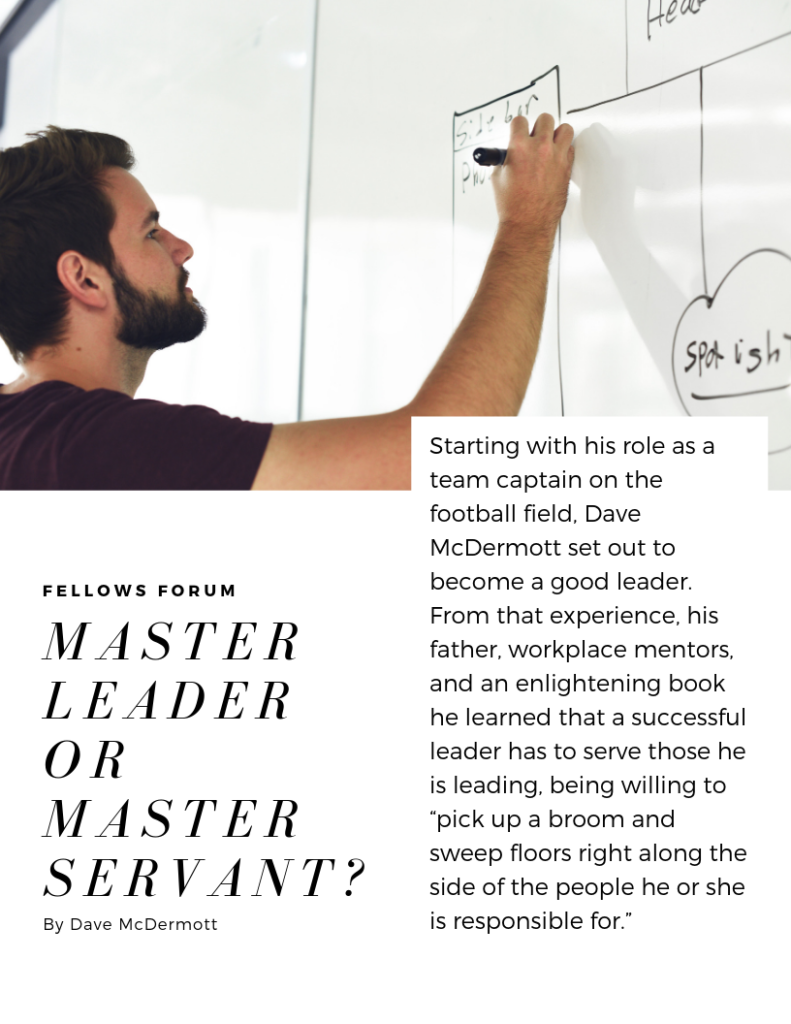Master Leader or Master Servant?

Fellows Forum
Starting with his role as a team captain on the football field, Dave McDermott set out to become a good leader. From that experience, his father, workplace mentors, and an enlightening book he learned that a successful leader has to serve those he is leading, being willing to “pick up a broom and sweep floors right along the side of the people he or she is responsible for.”
Many, many years ago I was fortunate enough to be promoted to the supervisor position within the records management department where I worked. It was an exciting time for me because the promotion was one of my first goals in my quest to become a leader, namely a director. But before we start, let me take you back to the beginning of my leadership journey.
Learning to Lead
During my younger years, I watched how my father managed his construction crews. I admired how he was able to navigate the complexities of managing his framers, finish carpenters, roofers, and other crew members. I grew to appreciate how the men and women respected his strong work ethic and his industry knowledge, and I did my best to emulate him.
Dad was driven to be the best in his field, and he would often say, “To build a good house, you need to be deadly accurate.” I think this somewhat applies to our profession, too: to build a strong information governance (IG) program, we need to be accurate and always strive for best practice.
On the Field
My first opportunity to be a leader came on the football field. As team captain, I made decisions about accepting or declining penalties, making shifts in the line, and, most importantly, backing up the other players on the field. I think that’s when I started to realize that one of the most important aspects of being a leader is to support the other players. I was always trying to make the right decisions, the right shifts, and the right calls, while also checking the sideline to make sure that I was communicating with the coaches.
At Work
This football experience was important when I took my first position in the IG world as a records analyst for a large corporation headquartered in Boise, Idaho. The position didn’t have any management responsibility, but it required teamwork and cooperation with the other staff members. I relied on my work ethic and what I had learned about being a team player.
I saw for the first time where leadership could make a difference in team morale and spirit, and that’s when I knew I wanted to do more than be just an employee. To be honest, I thought I would be a better supervisor than my own supervisor. How arrogant was that? I quickly learned that sometimes you must accept and follow the direction of leadership, even if you don’t agree with it.
My work ethic paid off in this position, as I was promoted to a record systems analyst. This is where I experienced my first leadership role in project-based work – and I fell flat on my face. I realized that leading people wasn’t an easy task. That’s when I started thinking about what my dad did to get the best out of his crew, and my thoughts on leadership started changing.
As the years passed, I had several, mostly project-based, leadership roles. I was driven and visibly not happy when the folks I was leading couldn’t keep up. I learned a hard lesson about the inappropriateness of expressing this emotion from my manager during performance reviews. That’s when things started changing for me: I realized that being driven and having a solid work ethic weren’t the only qualities I needed to be a successful leader. Far more important is to serve the people you lead and to focus on your staff’s needs over your own – but more on that later.
Leading a Team
Let’s fast forward to my first supervisor role. When I was promoted, I thought I had the world by the tail. I was finally going to lead people as a true supervisor. I had a staff of five people, all very competent in their roles and very hard working. Boy, did I learn quickly what working with five different personalities was all about!
I was fortunate enough to have a manager (and later a friend) who saw some potential in me and became my mentor. Fred was very patient, while giving constructive criticism and pushing me to be a better supervisor. He would often say, “A good supervisor isn’t afraid to pick up a broom and sweep floors right along the side of the people he or she is responsible for.” Hmm… this reminded me of my dad’s workplace example. I wondered if that was why he was a respected boss and if I was going about this leadership thing all wrong.
Early Lessons Learned
I learned several things during my first few years as a leader:
- Don’t micro-manage. Set realistic goals and let people perform.
- Never discount opinions or feelings. Just because you think something is trivial or petty, remember that the person who brings you a problem sees it as a major issue. (That lesson was hard to learn.)
- Let your people do it their way. Just because you wouldn’t do something a certain way doesn’t mean that it won’t work. After all, it’s about letting them be successful.
- Don’t lead with an iron fist. Treat employees with respect and listen to them.
I was happy doing my thing as a supervisor, learning not to lead with an iron fist and adding humor and fun to unpopular projects. But most of all, I was learning to understand my staff members’ needs and wants and to treat them with respect. I wasn’t always successful, but I was always willing to listen and was quick to offer an apology if I made a wrong decision. Through all this, I never lost my goal of leading the entire department.
Taking on a Larger Role
My manager (another dear friend) thought it was important that I round out my leadership experience by getting involved as a volunteer on the local ARMA Boise Valley Chapter board. (In fact, you could say my two friends set me up.) I learned through this that taking advantage of the opportunities that come with being involved with a professional organization is an essential way to advance your career. This also shows your employees the importance of this type of involvement.
This is not where my professional volunteerism would end. I eventually worked my way up to be elected to the ARMA International Board of Directors (BOD) and then as the BOD president-elect, which meant I moved up to serve as president and, ultimately, as the chairman of the BOD in 2005. I later followed the same steps of involvement with the Institute of Certified Records Managers (ICRM).
My manager told me later that he hadn’t wanted me to run for ARMA’s president-elect because of the time it would take away from my work duties. But, knowing that I wanted the opportunity to lead ARMA, he reached out to our senior vice president for his input and approval, which was wholeheartedly given. I later learned that my manager postponed retirement for three years so I could complete my leadership terms on the ARMA BOD. His sacrifice taught me a lot about serving the people who work for you.
Lessons Learned Through Experience
- Sometimes you have to serve your employees, even if it means sacrificing your dreams.
- Sometimes you have to let go of people to achieve a better end goal.
- Check your ego at the door when dealing with professionals.
- It’s okay to reach out to your colleagues and peers for advice about difficult decisions.
- If you don’t provide a clear target, you have nothing to aim at.
- Setting functional goals is a key to success.
- If you want people to follow you, remain positive; leave the negativity at the door.
- Be enthusiastic about decisions, even if you disagree.
- Constructive criticism, no matter how painful to receive or give, is valuable for growth.
- Know and understand your team members’ personalities.
- Communication means everything.
Leading Is Serving
I had more opportunities as a leader when I served as ARMA International’s president-elect and then president. The first lesson I learned was leading a paid staff is very different than leading a group of professionals who are accomplished leaders themselves and have diverse personalities, opinions, and experiences. Arrogance or ego wasn’t going to win the day here. Was I in over my head? Yup! Did I run from the challenges instead of face them head-on? No way! Not only was I the leader of the ARMA board and membership, I learned that I needed to become their servant, too.
Fellow ARMA BOD members Rick Weinholdt, Juanita Skillman, Cheryl Pederson, and I often talked about the complexities of leading an organization of volunteers and what it would take to be successful. Weinholdt gave me one of the greatest gifts I have ever received, Shar McBee’s book To Lead is to Serve: How to Attract Volunteers & Keep Them. The book provides great insight into running a volunteer organization, but, more importantly, it shows how to serve people in a leadership role. I recognized that many of the leader qualities listed in the book were ones I strived for in leading my paid staff. Could it be that leaders are servants to their staff?
I read McBee’s book with an open mind and applied many of the things I learned from it to leading ARMA and to serving and setting goals for my paid staff at the company that provided my paycheck. I liked the book so much that I purchased a copy for each ARMA board member, as I relied heavily on them to help ensure we were serving our members and volunteers.
Lessons from Leading to Serve
Some of the values learned from Shar McBee’s book To Lead is to Serve: How to Attract Volunteers & Keep Them:
• To attract volunteers, become attractive.
• Clear out negatives.
• Treat staff and volunteers like brothers and sisters.
• When we take good care of what we have, more comes to us.
• Enthusiasm is contagious.
• Individual work is weak. Teamwork is strong.
• Communicating means winning.
• Where there is friction between people, the work becomes weak.
• People want to be heard.
• Be open to suggestions.
• Know your audience.
• Hold back your opinion and simply listen.
• Patience means putting the brakes on strength.
Shar McBee’s “To Lead Is To Serve”
Setting Goals Is Key
Setting foundational goals is key to navigating the waters of serving and leading. McBee’s advice for reaching those goals is to “follow the example of water.” She explains, “Water reaches its goal by flowing on. When water comes upon a rock, it flows over it or around it. If the water stops flowing it becomes stagnant. If volunteers or staff become stagnant, you never accomplish your goals.”
As I navigated the leadership waters of ARMA, we set and accomplished many goals, perhaps the most important being to:
- Create a transparency model for communicating to our members
- Implement an annual strategic planning meeting that included our ICRM partners, the Fellows of ARMA International (FAIs), and others who could help us strategically position ARMA as the leading records management association.
We also made some difficult decisions as a board, including changes in ARMA headquarters and regional leadership. The hard lesson learned from this is that sometimes you have to ask people – even volunteers – to step down to keep the waters of progress from becoming stagnant.
Leading Volunteers Is Different
I came to appreciate the similarities and subtle differences in leading volunteers and leading paid staff. Both must be motivated and passionate about what they are doing, and they need to feel valued and appreciated for their efforts. The latter is perhaps more important for volunteers, who do not have the reward of a paycheck that might keep them engaged, making it much easier for them to quit. At the other end of the spectrum, letting go of a volunteer or a paid staff member who wants to stay is equally difficult, but leaders recognize that sometimes they are left with no other choice.
Leading by Example
I reached my goal of managing an enterprise IG department in the winter of 2006. But I realized after several years of directing the department, that managing people wasn’t really what I wanted to do. I discovered that I want to lead by example, serving in a capacity where I can motivate people and provide opportunities for improvement. So, I made the courageous decision to start my own consulting company, providing IG support and best practices to organizations; this includes galvanizing organizations to consider IG as a strategic initiative.
Leading to Success
I encourage anyone who is in or pursuing a leadership role to read McBee’s book. It validated how I wanted to lead, and it truly made me understand that even though I may be the leader, my job is to serve the very people I lead. That is what I strived for in my roles as a paid leader and as a volunteer leader for ARMA and the ICRM. I know I wasn’t perfect – my eye rolls and body language still get me in trouble at times. Many years ago, ARMA International’s president at the time, Ken Hopkins, asked me how I would know if I was successful as a leader. I answered, “If I could help one person come out of their shell and face their challenges, I would be successful.” I hope I have done that; I truly do live to serve.

Download the PDF version of this article.
[ls_content_block id=”896″]
[ls_content_block id=”629″]
About the Author

- Dave McDermott, CRM, FAI, is an independent consultant, providing information governance guidance and best practices to organizations. With more than 35 years’ experience in almost every facet of records and information management, he is a Certified Records Manager, Fellow of ARMA International, and past president and chairman of the board for both ARMA International and the Institute of Certified Records Managers. McDermott can be contacted at idahomcd@gmail.com.
